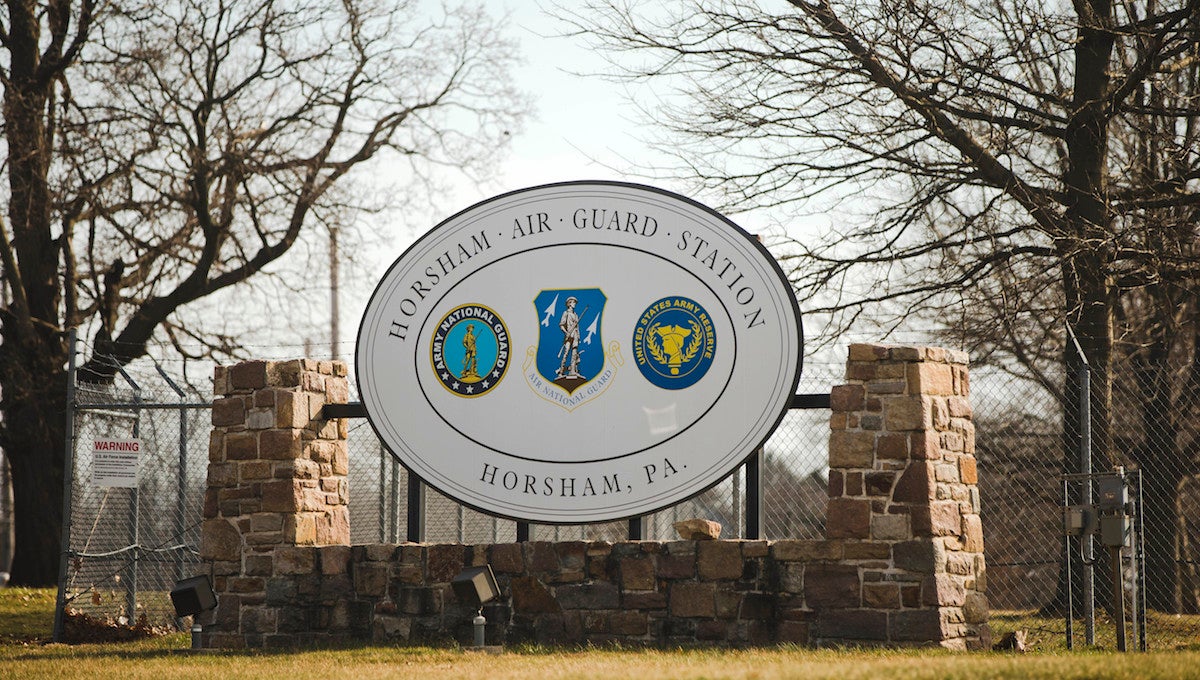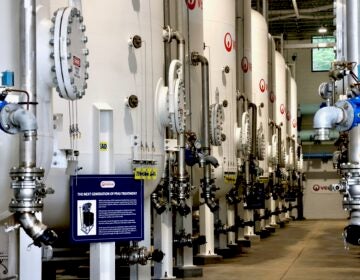N.J. landfill agrees to accept PFAS-contaminated soil from Pa. military base
Some New Jersey environmental groups oppose the planned dumping of material from the former Willow Grove Naval Air Station.

The front of the former Naval Air Station Joint Reserve Base Willow Grove and present day Horsham Air Guard Station. (Matt Rourke/AP Photo)
This story originally appeared on NJ Spotlight.
—
A New Jersey landfill has agreed to accept a consignment of soil contaminated with toxic PFAS chemicals that are increasingly seen as a threat to public health and are being more tightly regulated by New Jersey and other states. Some environmentalists have expressed alarm at the decision and have called for the dumping to be halted.
The soil is from the former Willow Grove Naval Air Station in Horsham, Pennsylvania, where high levels of PFAS chemicals have contaminated public and private water sources, and where the Navy is removing the most highly polluted soil.
The material will be taken to a landfill at Rosenhayn, near Vineland in South Jersey. The site is operated by the Cumberland County Improvement Authority, which has agreed to take 4,500 tons of soil from the base. The authority has determined that it meets the requirements of non-hazardous material even though it contains high levels of some PFAS chemicals. PFAS are a class of chemicals used in a number of different stain- and water-resistant products and include PFOA, PFNA and GenX among others. They do not break down easily in the environment and are currently unregulated by the federal government.
The authority agreed in mid-December to take the soil, but it has not yet been delivered, authority president Jerry Velazquez said Friday. He said it’s not unusual to have a delay in delivery after a contract is signed, but he said, in this case, it may be due to the now-ended federal government shutdown.
Velazquez said the landfill is double-lined, which guarantees that the chemicals in the soil will not leak into the nearby groundwater, as they have at Willow Grove and another military base nearby, contaminating the water and forcing utilities to install technologies that cut the presence of PFAS chemicals to levels that are designed to protect public health.
Planned dumping is ‘shameful’
Jeff Tittel, director of the New Jersey Sierra Club, called the dumping “shameful” and dismissed the authority’s assertion that its lined landfill won’t leak.
“All institutional controls fail at some point,” he said. “It’s called geology, it’s called physics.”
The man-made chemicals, formerly used in consumer products such as nonstick cookware and flame-retardant fabrics, have been linked to some cancers, low birth weights, elevated cholesterol and other illnesses. They have become the focus of growing concern by regulators and public-health advocates as more becomes known about their dangers.
New Jersey last year became the first state to adopt a tough new standard for one of the chemicals, PFNA, and it is considering similarly strict limits for two related chemicals. The chemicals have been found in more places and in higher concentrations in New Jersey than in many other states.
The planned shipment from the Willow Grove base would contain the facility’s most contaminated soil.
Environmentalists have greeted the move with consternation, especially since New Jersey has become a national leader in regulating the chemicals. But those proposed regulations have mostly focused on drinking water.
“It is unbelievable that the military would think to rid themselves of the pollution they caused by dumping it on their neighboring state and that New Jersey would allow this contamination to be accepted, especially considering the known PFAS contamination with which New Jersey is already burdened,” said Tracy Carluccio, deputy director of the Delaware Riverkeeper Network, and a longtime campaigner for tighter limits on PFAS.
Making PFAS contamination worse?
Carluccio called on New Jersey and Pennsylvania to halt the dumping and adopt regulations that would allow PFAS chemicals to be treated as hazardous chemicals. Currently no such regulations exist at the federal level.
“What the Willow Grove base is doing is not cleanup, it is sleight-of-hand manipulation that actually makes our PFAS contamination worse,” she said.
At Willow Grove, the Navy plans to remove soil containing at least 1,027 parts per trillion (ppt) for the chemical PFOS, or more than 14 times higher than the 70 ppt health limit recommended by the U.S. Environmental Protection Agency for drinking water. PFOS, which had the highest concentrations of any PFAS chemical at the site, is one of the chemicals that’s being considered for strict new regulation by the New Jersey Department of Environmental Protection.
Meanwhile, the Trump administration is expected to release proposed regulations for PFAS soon, but early reports say they won’t include a maximum contaminant level enforceable under the Safe Drinking Water Act, Politico reported Monday.
Like many other military bases around the country, Willow Grove is a major source of PFAS contamination because it used the chemicals in firefighting foam for decades.
Navy officials presented their plans to the Dec. 12 meeting of the Willow Grove Restoration Advisory Board, a panel that invites public input to the environmental cleanup of military bases. They said then that excavation started in November and was due to end in January.
In fact, the excavation is now complete, and the soil has been stockpiled and covered at Willow Grove pending approval by the EPA for it to be moved to the Cumberland County landfill. That approval has not been given because of the partial government shutdown and may take several weeks to implement after the EPA resumes full operations, said William Franklin, a spokesman for the Navy.
Material ‘meets the criteria for nonhazardous soil’
Despite the high level of PFAS contamination, the soil consignment did not meet the landfill’s standards for hazardous material, and so was accepted, according to a letter from the authority on Dec. 13.
“I have determined that this material originating from the above-referenced site [the Willow Grove base] meets the criteria for non-hazardous soil and is acceptable for use as daily cover at the Cumberland County Solid Waste Complex,” Velazquez wrote.
Willie Lin, environmental coordinator for the Willow Grove cleanup under the Base Realignment and Closure process, confirmed the material was determined to be nonhazardous.
“The soil removed from the former NASJRB Willow Grove, has been characterized in accordance with the applicable regulations and does not meet the definition of a hazardous waste,” Lin said in a statement. “This waste profile and information supporting it, including the concentrations of PFAS in soil, was provided to the disposal facility as well as the U.S Environmental Protection Agency for their review and approval.”
He said the Rosenhayn landfill had been chosen because it has the permits to take the materials found in the soil and because it was “the most cost-effective choice for the government.”
And he said the landfill had agreed to take about 1,000 tons more than the Navy’s estimate of the excavated amount to allow for additional weight if the soil turned out to contain more moisture than expected.
Just cleaning ‘the worst of the worst’
Hazardous waste is defined by the federal government as that which presents an imminent danger because of qualities such as explosiveness or corrosiveness, said Larry Hajna, a spokesman for the DEP, which is not currently required to issue permits for the dumping of contaminated soil.
Even though the Navy is removing the most contaminated soil from the base, it likely contains a lot more of the material even if what remains is not as highly tainted, said Chris Crockett, chief environmental officer for the water utility Aqua, which serves many communities in the area around Willow Grove and has installed carbon filters in some of its wells to prevent its water supplies exceeding the EPA’s health limit.
“They’re just cleaning the worst of the worst,” he said. “That doesn’t necessarily mean that the soil that’s below the 95th percentile doesn’t result in contamination. They took the really, really bad stuff away, which is a start.”
WHYY is your source for fact-based, in-depth journalism and information. As a nonprofit organization, we rely on financial support from readers like you. Please give today.




